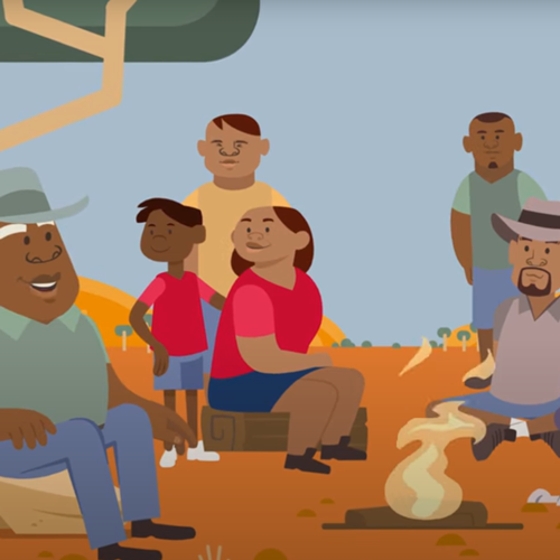
For professionals: CVD risk assessment for Aboriginal and Torres Strait Islander peoples
/
For professionals: CVD risk assessment for Aboriginal and Torres Strait Islander peoples
Recommendations for assessing cardiovascular disease (CVD) risk in Aboriginal and Torres Strait Islander peoples
Key takeaways
4 min read
On average, CVD events such as heart attacks, strokes and related mortality occur 10-20 years earlier in the Aboriginal and Torres Strait Islander population than in the non-Indigenous population.3
Aboriginal and Torres Strait Islander peoples without existing CVD should undergo CVD risk factor screening from the age of 18 years.
Aboriginal and Torres Strait Islander peoples without existing CVD should undergo an CVD risk assessment from age 30 years.
A CVD risk calculation should be carried out as part of an annual health check or opportunistically.
Patient modifiable risk factors include smoking status, blood pressure, serum lipids, waist circumference and BMI, nutrition, physical activity level and alcohol intake.
Patient non-modifiable risk factors include age, sex, family history of premature CVD, social history including cultural identity, ethnicity and socioeconomic status.
Related conditions include diabetes, chronic kidney disease, familial hypercholesterolaemia and evidence of atrial fibrillation.
In March 2020, a consensus statement was published on CVD risk assessment for Aboriginal and Torres Strait Islander adults under the age of 35.
Amongst the Aboriginal and Torres Strait Islander population, CVD accounts for a quarter of all deaths and it is the largest contributor to preventable morbidity and mortality. Research shows that 75% of Aboriginal and Torres Strait Islander adults under 35 years of age have one or more risk factors for CVD.
Compared to non-Indigenous adults, emerging evidence shows that high CVD risk starts earlier in Aboriginal and Torres Strait Islander adults. On average, CVD events such as heart attacks, strokes and CVD-related mortality occur 10 - 20 years earlier in the Aboriginal and Torres Strait Islander population than in the non-Indigenous Australian population.
This has informed the need to lower the age of CVD risk screening and management in Aboriginal and Torres Strait Islander adults.
How the consensus statement was developed
The consensus statement was developed by key peak bodies including the Heart Foundation, Australian National University, Royal Australian College of General Practitioners, National Aboriginal Community Controlled Health Organisation, Central Australian Rural Practitioners Association, Editorial Committee for Remote Primary Health Care Manuals, and other Australian Chronic Disease Prevention Alliance members.
You can find more information on how these recommendations were developed in the consensus statement.
Key recommendations from the consensus statement
Aboriginal and Torres Strait Islander peoples without existing CVD should undergo CVD risk factor screening from the age of 18 years at the latest. This includes diabetes and chronic kidney disease.
Aboriginal and Torres Strait Islander peoples without existing CVD should undergo a CVD risk assessment from age 30 years at the latest (cvdcheck.org.au). This now aligns with the Heart Health Check MBS item eligibility criteria.
Assessment should occur as part of an annual health check or opportunistically. Subsequent reviews should be conducted according to the level of risk.
- Aboriginal and Torres Strait Islander peoples aged 18 - 29 years with the following clinical conditions are automatically conferred a high CVD risk status:
type 2 diabetes and microalbuminuria
moderate to severe chronic kidney disease
high blood pressure: systolic blood pressure ≥ 180mmHg or diastolic blood pressure ≥ 110mmHg
high cholesterol: serum total cholesterol > 7.5 mmol/l
family history of high cholesterol.
General practices servicing Aboriginal and Torres Strait Islander communities have the option of conducting a health assessment specific to Indigenous patients (MBS item 715). This item offers wider clinical assessment options, greater age eligibility, and can be repeated every nine months.
A CVD risk calculation should be carried out during the 715 assessment, from age of 30 years.
Additional resources
Visit the Australian National University website for CVD risk resources that are designed for Aboriginal and Torres Strait Islander peoples.
References
Australian Institute of Health and Welfare. The health and welfare of Australia’s Aboriginal and Torres Strait Islander peoples 2015 [Cat. No. IHW 147]. Canberra: AIHW, 2015. https://www.aihw.gov.au/getmedia/584073f7-041e-4818-9419-39f5a060b1aa/18175.pdf.aspx?inline=true
Agostino JW, Wong D, Paige E, Wade V, Connell C, Davey ME, Peiris DP, Fitzsimmons D, Burgess CP, Mahoney R, Lonsdale E, Fernando P, Malamoo L, Eades S, Brown A, Jennings G, Lovett RW, Banks E. Cardiovascular disease risk assessment for Aboriginal and Torres Strait Islander adults aged under 35 years: a consensus statement. Med J Aust. 2020 May;212(9):422-427. doi: 10.5694/mja2.50529. Epub 2020 Mar 15. PMID: 32172533.
Australian Institute of Health and Welfare. Cardiovascular disease, diabetes and chronic kidney disease — Australian facts: Aboriginal and Torres Strait Islander people [Cat. No. CDK 5]. Canberra: AIHW, 2015. https://www.aihw.gov.au/getmedia/e640a6ba-615c-46aa-86d3-097d0dc1d0c3/19548.pdf.aspx?inline=true.
You might also be interested in...
-(1).jpg?width=560&height=auto&format=pjpg&auto=webp)
For professionals: Aboriginal and Torres Strait Islander peoples information and resources
Resources for providing best practice cardiovascular care for Aboriginal and Torres Strait Islander peoples.

Heart Health Check Toolkit
Streamline CVD risk assessment and management in general practice with the Heart Health Check Toolkit

Get a heart check (animation) for Aboriginal and/or Torres Strait Islander Peoples
A one-minute video for your waiting room or practice website.
Last updated09 May 2025